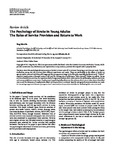The Psychology of Stroke in Young Adults: The Roles of Service Provision and Return to Work
| dc.contributor.author | Morris, Reg | |
| dc.date.accessioned | 2021-01-26T12:11:08Z | |
| dc.date.available | 2021-01-26T12:11:08Z | |
| dc.date.issued | 2011 | |
| dc.identifier.issn | 2090-8105 | |
| dc.identifier.issn | 2042-0056 | |
| dc.identifier.uri | http://hdl.handle.net/10026.1/16817 | |
| dc.description.abstract |
<jats:p>Literature about the psychological consequences of stroke in those under 65 is reviewed focussing on services and work. Despite similarities, young and old survivors have different experiences and needs. These are attributable to the effects of stroke on age-normative roles and activities, self-image, and the young person's stage in the life-cycle, especially family and work. “Hidden” cognitive impairments, a disrupted sense of self, and the incongruity of suffering an “older person's” disease are salient. Young survivors benefit from services, but experience lack of congruence between their needs and service philosophy, methods, and aims, and consequently have unmet needs. Employment is psychologically salient, and the evidence about return rates, factors that affect return, and the adequacy of employment-related service provision is reviewed. Specific and general recommendations are made for increasing congruence between young survivors' needs and service provision and also for facilitating their return to work.</jats:p> | |
| dc.format.extent | 1-10 | |
| dc.format.medium | Electronic | |
| dc.language | en | |
| dc.language.iso | eng | |
| dc.publisher | Hindawi Limited | |
| dc.subject | Aging | |
| dc.subject | Stroke | |
| dc.subject | Neurosciences | |
| dc.subject | Brain Disorders | |
| dc.subject | 7.1 Individual care needs | |
| dc.subject | Stroke | |
| dc.subject | 8 Decent Work and Economic Growth | |
| dc.title | The Psychology of Stroke in Young Adults: The Roles of Service Provision and Return to Work | |
| dc.type | journal-article | |
| dc.type | Journal Article | |
| plymouth.author-url | https://www.ncbi.nlm.nih.gov/pubmed/21423559 | |
| plymouth.volume | 2011 | |
| plymouth.publication-status | Published | |
| plymouth.journal | Stroke Research and Treatment | |
| dc.identifier.doi | 10.4061/2011/534812 | |
| plymouth.organisational-group | /Plymouth | |
| plymouth.organisational-group | /Plymouth/Faculty of Health | |
| plymouth.organisational-group | /Plymouth/Faculty of Health/School of Psychology | |
| plymouth.organisational-group | /Plymouth/REF 2021 Researchers by UoA | |
| plymouth.organisational-group | /Plymouth/REF 2021 Researchers by UoA/UoA04 Psychology, Psychiatry and Neuroscience | |
| plymouth.organisational-group | /Plymouth/REF 2021 Researchers by UoA/UoA04 Psychology, Psychiatry and Neuroscience/UoA04 Psychology, Psychiatry and Neuroscience MANUAL | |
| plymouth.organisational-group | /Plymouth/Users by role | |
| plymouth.organisational-group | /Plymouth/Users by role/Academics | |
| dc.publisher.place | United States | |
| dcterms.dateAccepted | 2011-01-09 | |
| dc.identifier.eissn | 2042-0056 | |
| dc.rights.embargoperiod | Not known | |
| rioxxterms.versionofrecord | 10.4061/2011/534812 | |
| rioxxterms.licenseref.uri | http://www.rioxx.net/licenses/all-rights-reserved | |
| rioxxterms.licenseref.startdate | 2011-03-08 | |
| rioxxterms.type | Journal Article/Review |


